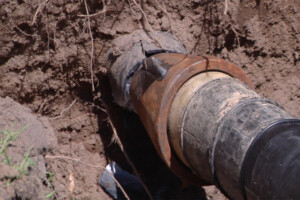 No homeowner wants to face problems with their plumbing systems as these can lead to costs of thousands of dollars in repairs. The important thing to know is that when your plumbing goes down, it is not just the pipes in your home that are affected but the pipes that connect your home to the main sewer lines outside.
No homeowner wants to face problems with their plumbing systems as these can lead to costs of thousands of dollars in repairs. The important thing to know is that when your plumbing goes down, it is not just the pipes in your home that are affected but the pipes that connect your home to the main sewer lines outside.
You should also know that the main plumbing problems typically occur in those main lines and the best way to avoid the problem is to catch them before they have a chance to fully form. Damaged sewer lines can lead to overflowing toilets, water disasters and the expensive repair works they can incur.
Signs Your Main Line is in Trouble
It can be hard to tell when the problem you are facing is a small issue with your pipes or a larger issue with your main sewer line. The only way to know for sure would be to have your plumbing inspected by a professional. A clogged toilet is a small problem, but if your main sewer line needs repairs, the work can be extensive and place a serious strain on a budget.
Here are some of the telltale signs that your main sewer line is in problems.
• Sewage backup and blockages
This will happen occasionally and is not usually a cause for alarm especially if you can unblock the toilet with a plunger. But, if you see that sewage backs up every time you flush the toilet, you could be looking at a serious issue. If you see that this problem is affecting more than a single drain, your issue could be in the main sewage line.
• Foul odors
If your main sewer line is intact, it is also airtight and no foul odors should be emitted into the vicinity. So, if you do begin to smell the unmistakable odor of rotten eggs this could indicate a serious problem in your sewage line. Your sewer could have sprung a leak and the repairs will have to be handled professionally.
• Mold
Mold occurs when moisture meets the millions of microscopic spores that exist in just about any household. Even the smallest amount of moisture is enough to support the needs of growing mold colonies. Mold is and for the health and especially destructive to your home’s structures. If you notice this menace in your home, it will be time to call in the professionals.
• Slow drains
One of the most common causes of a plumbing issue can involve the cogs and most often these can be addressed with the common household plunger. But, if your DIY efforts are ineffective, don’t get tough, get help. Clogs that resist your efforts to dislodge them could be indicative of a larger problem in the main sewer line. The truth is these larger clogs will often require a deeper understanding and more refined methods to set them straight.
• Lush patches of grass
If one section of the lawn is looking especially lush and green, it could be getting extra nutrients and moisture from somewhere you would rather it was not. Sewage is a terrific fertilizer and the leaking sewage line could be feeding your lawn.
• Foundation cracks
A damaged sewage lawn is not just a yucky inconvenience, it can actually begin to affect the ground around your home and present problems in your foundation. Broken sewer lines that are left untreated can lead to the ground shifting around the foundation and even cause sinkholes that can cause serious problems in the structural integrity of your home.
• Pools of septic waste
One of the more obvious signs that a problem is developing in your home is a minor or massive pool of sewage forming on your property. This could be caused by a considerable crack in your sewer mains.
Leave it to the Professionals
Plumbing problems are no joke and can disrupt the smooth functionality of your property. Some of these problems can be addressed with experienced DIY efforts but not all. If you have made your best efforts to right the wrong, it would be a good idea to call in the specialist. Don’t wait till things get really bad to call for help. Call in the professionals with a solution as soon as you suspect the problem is beyond your capacity to repair.
